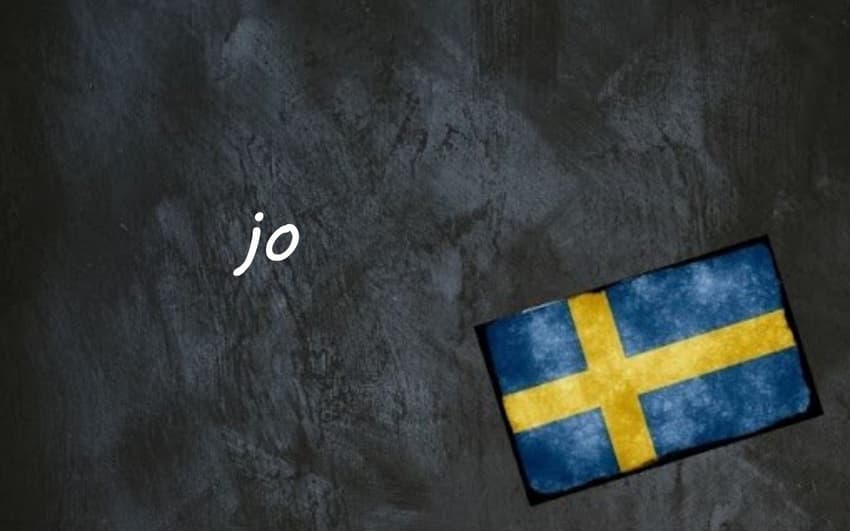Swedish word of the day: jo

Jo and ja both mean yes. But when do you use one or the other?
Jo, like the word ja, means yes – but knowing which of the two to use is often tricky for Swedish learners.
A reasonably simple rule to remember is that ja is used for affirmative answers to positive questions...
Talar du svenska? Ja (Do you speak Swedish? Yes)
… and jo is used when answering negated questions in the affirmative:
Talar du inte svenska? Jo (Don't you speak Swedish? Yes [I do])
Jo is also often used as a more insistent yes: "I don't want fika." "Jooo, just a cinnamon bun!"
Or when arguing with someone: "Nej!" "Jo!" "Nej!" "Jo!"
In other words, it is used to mark that the answer to a negative question is not what might have been expected or to express an opinion which is different from what someone else just said, but it can also express reluctant agreement ("jo, men..." "yes, but...") or be used at the a start of a sentence to make sure you have people's attention before you get to the point, the same way an English speaker might use "well" or "so".
- Don’t miss any of our Swedish words and expressions of the day by downloading The Local's new app (available on Apple and Android) and then selecting the Swedish Word of the Day in your Notification options via the User button.
Jo may be a short interjection, but it is full of nuances that can be interpreted differently depending on tone of voice, inflection or use of extra words: the more insistent joho, jojomen, jodå, jo visst, or the slightly less certain jovars. And an impressed "jo jo" can be used to mean "well, well".
To confuse matters further, in northern Sweden the word jo is used more frequently and in a wider range of contexts, and is often interchangeable with ja. It is often also inhaled, causing that strange yes that sounds more like a gasp.
Examples:
Kommer du inte? Jo, jag ska bara göra en grej först
Are you not coming? Yes, I'm just going to do a thing first
Svenska är inte ett svårt språk. Jo, det är det!
Swedish is not a difficult language. Yes, it is!
Jo, det är så att min mamma kommer på besök i morgon
Well, you see, my mum is coming to visit tomorrow
Jodåsåatt
I have nothing to say so I'm using this filler word to make the silence less uncomfortable (Literally: yes-then-so-that)
Looking for a good idea for a Christmas present?
Villa, Volvo, Vovve: The Local’s Word Guide to Swedish Life, written by The Local’s journalists, is available to order. Head to lysforlag.com/vvv to read more about it. It's also possible to buy your copy from Amazon US, Amazon UK, Bokus or Adlibris.
Comments
See Also
Jo, like the word ja, means yes – but knowing which of the two to use is often tricky for Swedish learners.
A reasonably simple rule to remember is that ja is used for affirmative answers to positive questions...
Talar du svenska? Ja (Do you speak Swedish? Yes)
… and jo is used when answering negated questions in the affirmative:
Talar du inte svenska? Jo (Don't you speak Swedish? Yes [I do])
Jo is also often used as a more insistent yes: "I don't want fika." "Jooo, just a cinnamon bun!"
Or when arguing with someone: "Nej!" "Jo!" "Nej!" "Jo!"
In other words, it is used to mark that the answer to a negative question is not what might have been expected or to express an opinion which is different from what someone else just said, but it can also express reluctant agreement ("jo, men..." "yes, but...") or be used at the a start of a sentence to make sure you have people's attention before you get to the point, the same way an English speaker might use "well" or "so".
- Don’t miss any of our Swedish words and expressions of the day by downloading The Local's new app (available on Apple and Android) and then selecting the Swedish Word of the Day in your Notification options via the User button.
Jo may be a short interjection, but it is full of nuances that can be interpreted differently depending on tone of voice, inflection or use of extra words: the more insistent joho, jojomen, jodå, jo visst, or the slightly less certain jovars. And an impressed "jo jo" can be used to mean "well, well".
To confuse matters further, in northern Sweden the word jo is used more frequently and in a wider range of contexts, and is often interchangeable with ja. It is often also inhaled, causing that strange yes that sounds more like a gasp.
Examples:
Kommer du inte? Jo, jag ska bara göra en grej först
Are you not coming? Yes, I'm just going to do a thing first
Svenska är inte ett svårt språk. Jo, det är det!
Swedish is not a difficult language. Yes, it is!
Jo, det är så att min mamma kommer på besök i morgon
Well, you see, my mum is coming to visit tomorrow
Jodåsåatt
I have nothing to say so I'm using this filler word to make the silence less uncomfortable (Literally: yes-then-so-that)
Looking for a good idea for a Christmas present?
Villa, Volvo, Vovve: The Local’s Word Guide to Swedish Life, written by The Local’s journalists, is available to order. Head to lysforlag.com/vvv to read more about it. It's also possible to buy your copy from Amazon US, Amazon UK, Bokus or Adlibris.
Join the conversation in our comments section below. Share your own views and experience and if you have a question or suggestion for our journalists then email us at [email protected].
Please keep comments civil, constructive and on topic – and make sure to read our terms of use before getting involved.
Please log in here to leave a comment.